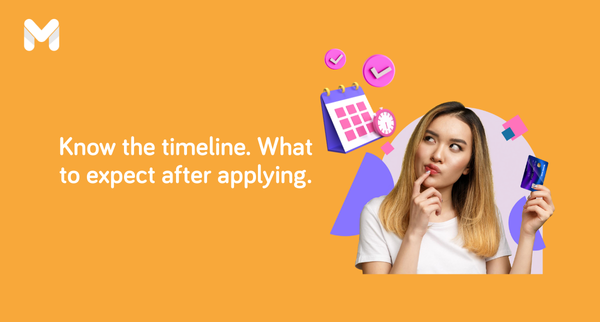Applying for a credit card in the Philippines can be a smart financial move—especially when you understand not only how long approval takes, but also how to manage your card after you get it.
Whether you're a student, freelancer, OFW, or parent, aligning your credit card application with your financial habits can help you build a strong credit profile while staying out of debt.
Let’s walk through the typical credit card approval timeline, budgeting tips, and practical ways to stay on top of your finances after approval.

Understanding Approval Timeline
Credit card approval timelines vary depending on several factors, including the bank, your financial documents, and your application method. Here's a breakdown:
Online Applications
Digital-first banks and traditional banks with strong online services offer online credit card applications. If your documents are complete and you meet eligibility requirements, you may receive approval within 1 to 3 banking days. Some providers offer instant conditional approval, but final verification still takes time.
In-Branch Applications
Applying at a physical bank branch may take longer—usually 5 to 10 banking days—especially if additional documents are required or manual verification is involved.
Card Delivery
Once your application is approved, your physical credit card is typically delivered via courier within 5 to 7 business days.
Pro Tip: To avoid delays, prepare all the necessary documents ahead of time:
- At least one valid government-issued ID
- Proof of income (e.g., payslips, COE, ITR)
- Proof of billing
- TIN or SSS number
Submitting clean, complete, and updated documents increases your chances of faster approval.
Budgeting Around Approval and Billing Cycles
Understanding how your credit card billing cycle works gives you better control over when to spend and when to pay.
Key Dates to Know:
- Statement Cut-Off Date: The last day of your billing cycle. Any transactions made after this date are posted in the next billing period.
- Due Date: Typically falls 20–25 days after the statement cut-off. If you pay the full balance by this date, you won’t incur any interest.
Example:
If your cut-off is April 15 and your due date is May 5, a purchase made on April 16 will only be due by June 5. That’s up to 50 days of interest-free float, which can help with big-ticket purchases—if you plan them smartly.
Credit Card Budgeting Tip:
Time large or essential purchases right after your cut-off date to give yourself a longer time to pay them off without interest.
Using Credit Cards Wisely
Liza – The Single Parent
Liza uses her credit card for essential spending like groceries, bills, and school expenses. She tracks her spending using her mobile banking app and pays her full balance each month. By doing so, she avoids interest and builds good credit.
Marco – The Freelance Designer
Marco’s income fluctuates, so he sometimes pays only the minimum amount on his card. This keeps his account in good standing, but he’s aware that interest is compounding on the remaining balance.
The Lesson:
Making only the minimum payment credit card strategy may buy you time—but it’s costly. To minimize interest charges, aim to pay more than the minimum or clear the full balance monthly.
Using Digital Tools for Credit Management
Mobile apps and e-wallets are powerful allies for smart credit card usage. They help you stay organized, informed, and on track with your payments.
Recommended Tools:
- Banking Apps: View real-time balances, download credit card statements, and set custom reminders for payment due dates.
- E-Wallets like GCash or Maya: Convenient for paying credit card bills, setting daily spending limits, and monitoring transaction histories.
- Budgeting Apps: These help categorize expenses and project future spending.
How to Use a Credit Card Wisely
Set spending notifications and alerts through your bank app. Automate bill payments to avoid missing due dates and incurring fees. Use your tools not just to track spending—but to anticipate it.
Automating Payments to Avoid Late Fees
Even one missed payment can result in penalties, added interest, and a drop in your credit score. Automation is a simple fix.
Strategies:
- Auto-Debit Enrollment: Enroll in your bank’s auto-debit facility to pay either the minimum or full amount directly from your savings account.
- Set Reminders: Use mobile calendars or SMS/email notifications from your bank.
- Pay Early: Make your payment at least 3 days before the due date to avoid delays caused by processing issues or system downtimes.
Credit Card Budgeting Tip:
Paying ahead of time not only protects your credit score—it gives you peace of mind and keeps you in control of your finances.
Recognizing and Managing Overspending Triggers
Overspending is often driven by emotion, impulse, or cognitive bias. Here’s how to recognize and prevent these behaviors:
Common Overspending Triggers
- Emotional Spending2: Retail therapy or spending due to stress.
- Impulse Buying: Making snap decisions—often online—with minimal thought.
- High Credit Limit Illusion: Seeing a high available credit makes you feel you can spend more than you should.
Strategies to Curb Overspending
- Create a monthly credit card budget and stick to it.
- Use the 24-hour rule: Delay any non-essential purchase for a day.
- Review your statement weekly to reflect on where your money is going.
- Unlink your credit card from apps or stores that encourage frictionless spending.
Understanding the psychology behind spending helps you stay grounded—and empowers you to use credit as a tool, not a trap.
Apply for the Right Credit Card
Credit card approval can take just a few days—but building good financial habits lasts much longer. From choosing the right card to managing it responsibly, every step matters.
Compare credit cards on Moneymax to find one that suits your lifestyle, spending habits, and financial goals.
Whether you're after no annual fee cards, cashback, or flexible payment terms, there's a card out there that can work for you—without the stress of surprise interest charges.
Sources:
- [1] Guide to Credit Card Minimum Payments ((Bankrate, September 2024)
- [2] Emotional Spending: How to Deal (And Prevent) Retail Therapy (Experian)






